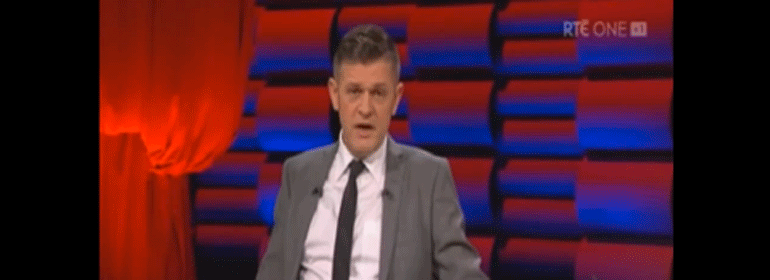If the Iona Institute let RTÉ away with Rory O’Neill’s Saturday Night Show comments, their whole campaign would have been fundamentally undermined, says Brian Finnegan.
On Saturday night a decidedly uncomfortable Brendan O’Connor apologised on behalf of RTÉ for any “distress” caused to members of The Iona Institute and newspaper columnists, John Waters and Breda O’Brien, by comments made by Rory O’Neill on The Saturday Night Show two weeks ago, in which he suggested they are homophobic. The apology came after RTÉ bosses received solicitor’s letters from several members of Iona, including O’Brien. They also received a letter from solicitors representing Waters.
“It is an important part of democratic debate that people must be able to hold dissenting views on controversial issues,” O’Connor said, as part of the apology, an unnecessary and contradictory addendum, given that the apology shuts down debate on the controversial issue of homophobia on RTÉ.
But I agree – people must be able to hold dissenting views as part of democratic debate. I also think that other people must be able to have opinions about those views. To my mind, Rory O’Neill was simply stating his opinion.
It is the space where O’Neill stated his opinion that’s very important here. He called The Iona Insititute, Breda O’Brien and John Waters homophobic on a primetime weekend show from our national broadcaster, one of the most watched in the country. The studio audience for The Saturday Show is not made up of the LGBT community. It’s generally made up of average Joes and Joans, aged between 25 and 35. This audience burst into applause when O’Neill said what he said.
In sitting rooms across Ireland, it’s highly unlikely a large number of LGBT people tune into The Saturday Night Show. The majority audience for the programme is middle-Ireland, not urban queer. Middle-Ireland watched O’Neill, heard what he clearly and passionately said, and saw a studio audience burst into applause. The atmosphere of the show was certainly on O’Neill’s side.
The Iona Institute’s campaign against same-sex marriage runs on a very clear line: a child is entitled to a mother and a father. Iona spokespeople reiterate this line in many different ways, but it is always the same message. They speak in positive terms about “valuing fatherhood and motherhood” and say the “sexual complimentarity of men and women” in the context of raising children “should be embodied in a special and distinct social institution” – i.e. marriage.
Although they spout lots of statistics gleaned from right wing organisations in America, which say children of same-sex parents are at a disadvantage, Iona spokespeople never make statements like: “gay people are intrinsically disordered”, or “gay people are bad parents”, or “gay people should not be allowed to have children”. If they did, Iona’s campaign to stop legislation that equally recognises same-sex parented families could easily be called an anti-gay campaign. Iona would prefer that Ireland sees it as a campaign for the welfare of children, a positive pro-family campaign rather than a negative anti-gay one.
When O’Neill called The Iona Institute homophobic on The Saturday Night Show and was overwhelmingly endorsed by the studio audience, the message – to me at least – was clear: a good many people are not buying the line they’re selling. If Iona had let RTÉ get away with it, and that clip remained on the Internet for the rest of eternity, their ‘positive’ child-centered strategy would have been negated and undermined on the national broadcaster, in front of middle Ireland. So, they took legal action that resulted in the clip being buried, along with the apology.
Apology or not, the horse may have already bolted, given the amount of coverage O’Neill’s interview got (including the apology itself). If Iona pursue legal action against O’Neill there’ll be a lot more publicity, and whether they like it or not the fight will become Iona Vs The Gays, not Iona standing up for the ‘ideal’ heterosexually parented family.
One way or another, there is some dangerous fall-out from RTÉ’s apology. Nobody can go on the national broadcaster and call someone they believe to be a homophobe, homophobic again. Otherwise more solicitors letters will be sent, and the bosses at RTÉ will be forced to apologise again, and pay out compensation, as they did to members of the Iona.
We’re going to have to find other words to express our dissenting view in this democratic debate on an issue that has been made controversial by religions and religious-run organisations. In the meantime, I have decided to give up paying my TV Licence. I refuse to help fund a public broadcaster that removed footage from the Internet that was part of democratic debate.
© 2014 GCN (Gay Community News). All rights reserved.

comments. Please sign in to comment.